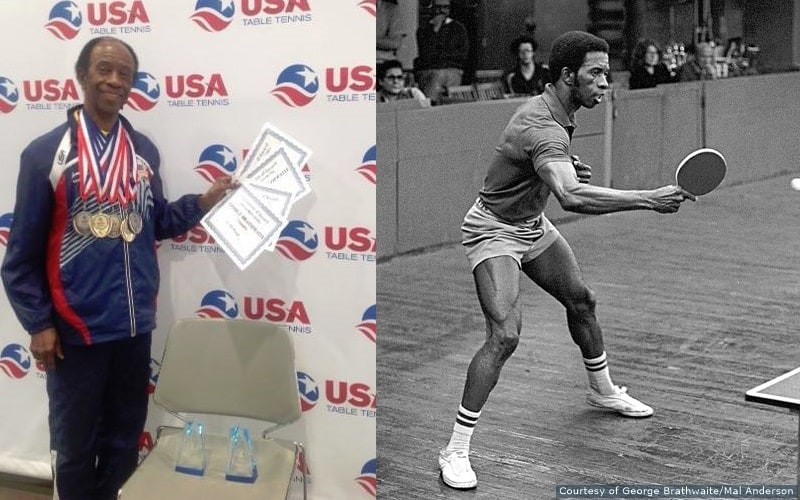86 years ago, a diplomat was born. In 1934, George Braithwaite first breathed air in Georgetown, Guyana, when the country was still under British rule. An excellent athlete with a gift for cricket, Braithwaite also represented his country in track and field at the 1958 Caribbean Games, medaling in various sprinting events. Little did the young George know how the combination of explosive foot speed and a knack for wielding a bat would shape the trajectory of his life. In 1961, the future diplomat found himself in New York, appropriately enough working for the UN as a statistics clerk. One day, fate tapped Braithwaite on the shoulder. Looking for some documents in a file cabinet (millennials and younger, ask your parents), he was surprised to find an old hard-rubber ping-pong paddle. Intrigued, he learned that a fellow employee stashed it there for playing upstairs during breaks. When the co-worker quit, he left the paddle behind. One day, on a whim, George took the paddle upstairs to the rec room and tried it out. While his natural athleticism lent him many advantages, an instant understanding of table tennis was not among them. Despite the slow start, or perhaps because Braithwaite had finally found a challenge in the world of sport, he kept playing. And playing. And playing. Seven years later, he was a member of the US National Team. Braithwaite further expanded his diplomatic ambit, working as a goodwill ambassador for the US Table Tennis Association (now USATT) in Central America. When Braithwaite and the rest of the US team traveled to Nagoya, Japan for the 1971 World Table Tennis Championships, fate once again intervened. One of Braithwaite's teammates, the free-spirited young Glenn Cowan, accidentally boarded the wrong team bus and found himself sitting awkwardly among his ostensible enemies in the Cold War, the redoubtable Chinese team. China, still completely closed to westerners, was reemerging after six years of self-imposed exile from table tennis during the Cultural Revolution. Cowan's bus mishap could have been a disaster, or worse, inconsequential. Thanks to Cowan's disarming guilelessness, however, an unlikely series events led to the entire US team being invited to visit mainland China. Soon, Braithwaite et al. were putting on friendly exhibitions with the Chinese team, rubbing elbows with Mao Zedong and Richard Nixon. A PR coup for all parties involved, the improved relations between the countries were attributed to "Ping-Pong Diplomacy." Earning the honorific title of "The Chief" from his peers, the globe-trotting diplomat Braithwaite stayed active in table tennis throughout his life. In addition to winning the 1979 Caribbean men's singles title, he racked up over 70 singles and doubles championships at the US Open and US Nationals. A marvel of fitness well into his 80s, Braithwaite went toe-to-toe with world #2 Xu Xin last year in preparation for the celebration of the 50th anniversary of Ping-Pong Diplomacy. Current USATT CEO Virginia Sung recalls how Braithwaite diplomatically played the role of ambassador when she arrived to New York from China speaking no English. "Chief was one of the people who welcomed me to the Table Tennis community when I first arrived in New York City from China at age 14," writes Sung. "I always consider myself very lucky to have grown into a decent woman from this little girl who doesn't speak any English and get all the support from great people every step of the way." On October 26, in his adoptive home of New York, Braithwaite succumbed to a brief illness. He is survived by his daughter Sharon and sons Sean and George Jr. A true diplomat, George Braithwaite helped bring peace to the world. We pray that "The Chief" and his family may also find peace.
More at USATT
